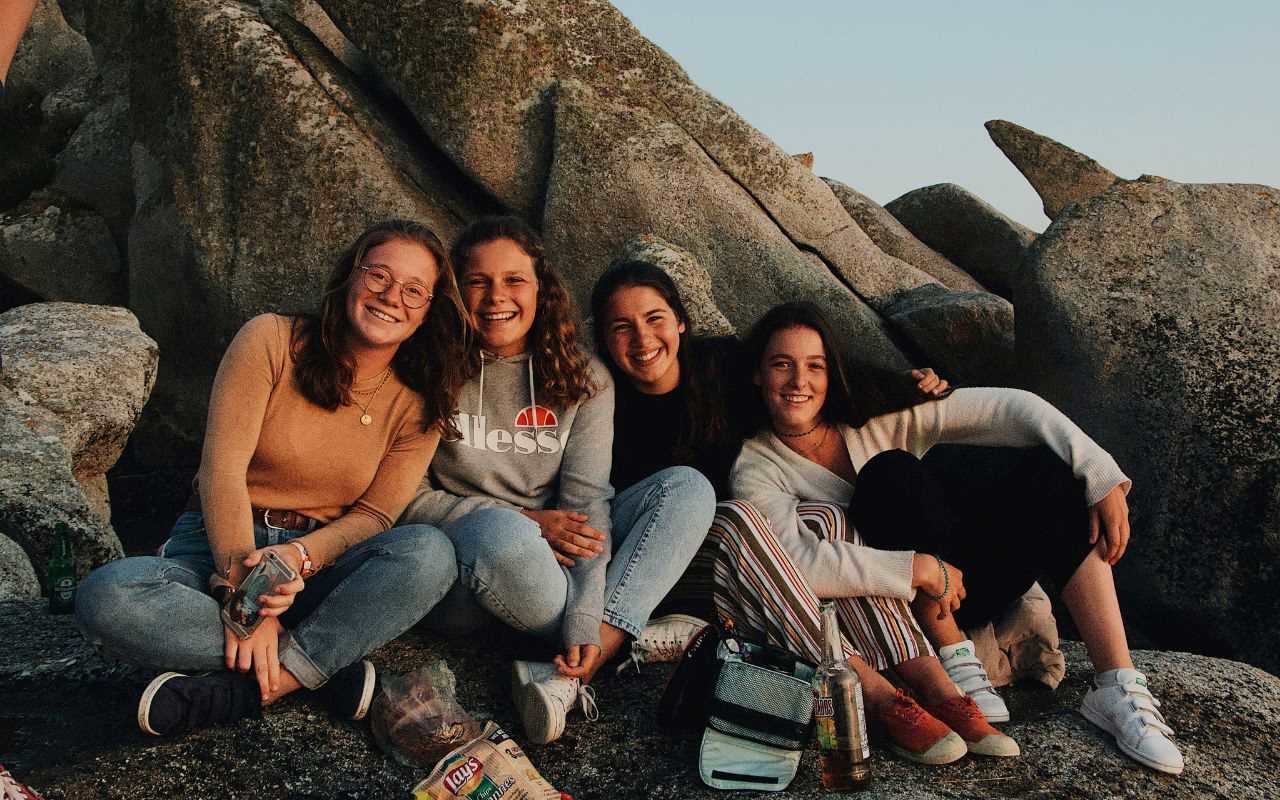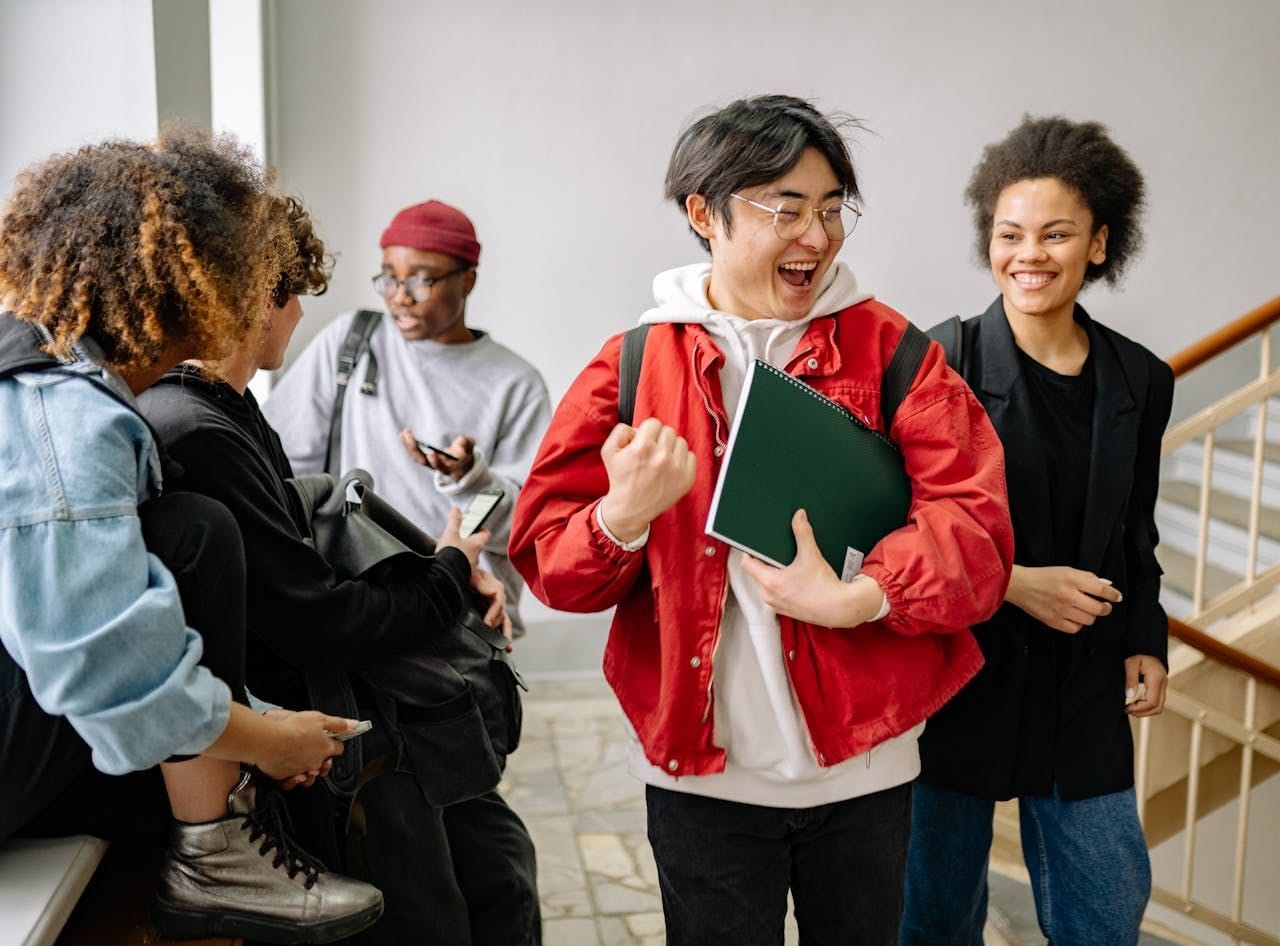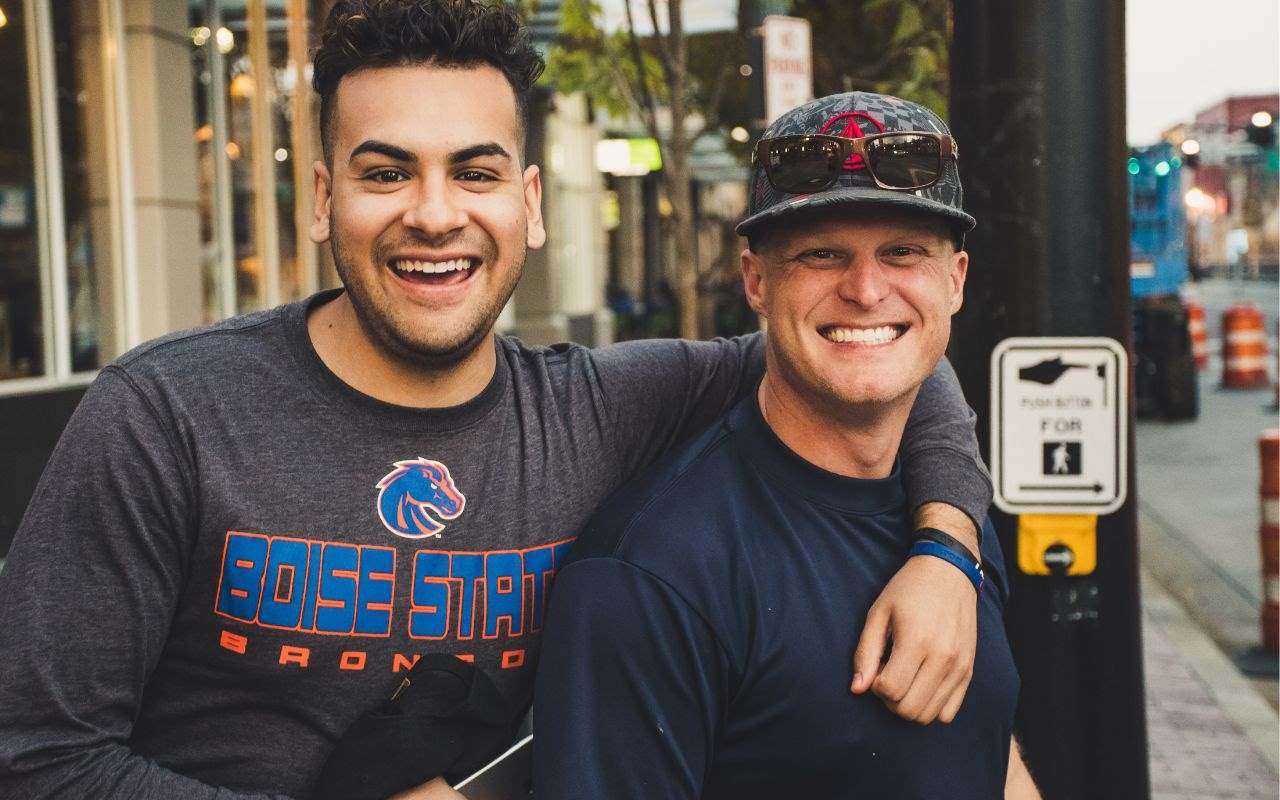Making friends in college is not just about having someone to hang out with or going to parties together. Friendships play a crucial role in personal development and can greatly impact your overall college experience.
Ahead, we will explore the importance of friendships in college, strategies for making new friends, and tips for building strong and lasting connections. Additionally, we will discuss how to overcome the challenges that may arise along the way. So, let's dive in and discover the keys to social success in college!
At Bold.org, we recognize that making friends and engaging with student life is integral to your experience in university and in the professional world after school. Our team, with extensive experience in student life, is here to help you understand how to make friends in college and find scholarship opportunities to support your education. Let's dive in!
Apply for student life and leadership scholarships to help pay for your education!
The Role of Friendship in Personal Development
Friendships go beyond providing companionship; they have a profound impact on personal growth and development throughout your academic career and beyond. Students with strong social connections tend to have higher levels of well-being, academic success, and overall satisfaction with their college experience.
The connections you make during this formative period can lead to valuable networking opportunities, career advancements, and lifelong bonds. These relationships can open doors to new experiences and help shape your identity and aspirations.
Having friends in college can deeply influence your personal growth. Interacting with diverse individuals exposes you to new ideas, perspectives, and experiences, fostering intellectual and emotional development. Friendships allow you to challenge your beliefs and develop a more well-rounded understanding of the world.

How Friendships Impact Your College Experience
College can be an overwhelming experience, and having a support system of friends can make a significant difference. Friends provide emotional support, help you navigate challenges, and offer a sense of belonging in a new environment. Friendships can enhance your cultural competence and social skills.
Interacting with peers from various backgrounds can broaden your cultural awareness, improve your communication abilities, and teach you valuable lessons in empathy and understanding. These interpersonal skills are crucial for thriving in a diverse academic environment and for succeeding in future professional settings.
Preparing Yourself to Make Friends in College
Making new friends can be both exciting and nerve-wracking, especially in a new setting. Attending university is a chance to start fresh socially, expand your horizons beyond your high school friends, and make new friends from around the globe with similar passions and interests.
One key aspect to keep in mind when embarking on the journey of making new friends is the importance of authenticity. Being true to yourself and your values will attract new people who appreciate you for who you are. Authenticity fosters genuine connections that can withstand the test of time and adversity.
Get Matched to Thousands of Scholarships
Create your Bold.org profile to access thousands of exclusive scholarships, available only on Bold.org.
Create Free ProfileDeveloping a Positive Mindset
Approaching the experience of friendships with an open and positive mindset can significantly improve your chances of building meaningful relationships.
Believe in yourself and your ability to connect with others. If you are feeling shy, take a deep breath and remember that many students are also looking to make friends and are likely experiencing similar feelings of uncertainty.
Another crucial element in developing a positive mindset is practicing self-compassion. Be kind to yourself throughout this process, understanding that not every interaction will lead to a lifelong friendship, and that's perfectly okay. Self-compassion allows you to bounce back from rejections or awkward moments with resilience and grace.
Embracing Openness and Diversity
College campuses are rich with diversity, offering opportunities to meet people from different backgrounds, cultures, and perspectives. Embrace the chance to learn from others by being open-minded and respectful.
Engaging in conversations that explore different viewpoints can broaden your own understanding of the world and deepen your relationships. Embracing diversity also involves stepping out of your comfort zone and trying new activities or joining clubs that align with your interests.

Join Clubs or On-Campus Organizations
On-campus organizations and clubs are a great way to meet like-minded individuals and potential friends in college. Whether it's a sports team, an academic club, or a hobby group, getting involved in extracurricular activities allows you to meet people with common passions and values.
Being part of a club or organization can also enhance your leadership and teamwork skills while adding valuable experiences to your resume. To meet potential friends with similar interests, consider attending club meetings in any of the following spheres of interest:
Campus-Based Clubs
A campus club, like a college radio station, is a great way to make college friends. Student engagement at clubs with an on-campus office or headquarters, like a radio station, events committee, or student government, is often high since these are usually the largest or most funded clubs on campus, to which administrations allocate the greatest amount of resources.
Plus, clubs with a consistent physical presence on campus give you a new place to hang out and meet new people with similar interests. Explore the Center for Student Life at your school in order to find these clubs, join one that sounds cool, and make an effort to connect with members.
Performing Arts Clubs
Making friends with other students who have common interests in creativity or the arts can be as simple as joining performing arts clubs. Whether you are interested in singing, acting, dancing, music-making, fine arts, filmmaking, playwriting, creative writing, or more, your school likely has an arts club catering to your creative niche!
Cultural Clubs
Cultural clubs cater to different backgrounds, nationalities, spiritualities, and causes. If you are hoping to make friends and connect with students of a similar identity to your own, cultural clubs are a great place to find community on campus.
Sometimes, these clubs take the form of a student union advocating for the needs of a particular group. If you are passionate about causes related to identities on campus, these clubs are a great option for you.

Academic Clubs
Academic clubs usually center on a specific subject or profession, such as a mathletics club, debate team, or public health student association. By joining an academic club related to your major, you can get a great sense of the students within your program and find those passionate about your field of study.
You can even join an academic club if you aren't majoring in a subject but still share a passion for it since these clubs often host special lectures, research opportunities, and other events for students to connect with one another over their favorite topic.
Find academic clubs catering to your own niche interests and speak with friendly faces at club meetings and events in order to jump-start the process of making friends in school.
Pre-Professional Clubs
Pre-professional clubs are similar to those for academics, though their scope focuses on the business aspects of a field of study rather than being limited to research and academia. Pre-health and pre-dental student associations, clubs for aspiring lawyers, and business student alliances are all examples of common pre-professional clubs.
These clubs are not only a great place to make friends in college with students pursuing similar professional goals but also an excellent way to prepare for your career. These clubs often hold networking events with alumni working in their industry of focus, as well as inviting standout professionals for keynote speeches and Q&A events.
Volunteer Clubs
Volunteer clubs are a great place to meet like-minded individuals equally passionate about a particular cause. Whether you are passionate about causes like climate change, activism, supporting the disadvantaged, or on-campus issues specific to your school, every institution offers a number of volunteer groups to get involved in various causes.
If you're aiming to pursue social change as a career, volunteer clubs will help you connect with others of the same value system who are dedicating their careers to similar missions. Joining a volunteer group is how to make friends in college while making a difference in the world!

Attend On-Campus Events
College campuses are hotbeds of student life. Attending campus-wide events can be an excellent way to engage with a larger community.
From orientation activities to cultural festivals, college campuses offer a wide range of events that provide an opportunity to meet new people and discover shared interests. Check your school email regularly and consider subscribing to events-related newsletters in order to stay up-to-date on events at your school.
Invite people you meet on-campus, in clubs, or your fellow classmates to attend events with you. Oftentimes, on-campus events involve free food. Programming throughout the year can range from small events to huge productions, depending on the size of your school.
Laid-back entertainment options like a movie night are held frequently throughout the school year and are a great place to chill with new people. It is common for schools to hold a large campus festival or a concert to celebrate either the beginning or the end of the school year. Such events of all scales are great places to meet people and explore new interests.
Networking Events and Professional Development
If you are pursuing a specialized career, such as a career in the arts and entertainment, entrepreneurship, social change, or a profession like healthcare or dentistry, find out what professional development resources your institution offers related to your field.
It is common for colleges to have on-campus centers for particular professions, such as a startup incubator supporting entrepreneurs with professional development resources and events.
Spending time at these facilities and attending relevant programming and networking events will not only support your professional development but also facilitate connections with like-minded people.

Get Involved with Greek Life
Greek organizations are an effective way to make new friends quickly. Joining such a community appeals to many students since these groups are so tight-knit and host many events throughout each semester.
If you are interested in joining Greek life, research the Greek organizations at each institution you apply to in advance of making any admissions decision. Try to visit the campus in advance of committing to any institution in order to get a better idea of the social scene overall and how Greek organizations fit into the campus culture.
Work a Campus Job
Campus jobs are a great way to meet students from across majors and departments. They also provide a fun opportunity to watch and bond with coworkers. If you choose a student-facing campus job, like working as an RA, you can expand your friend circle while bonding with a lot of students from all backgrounds and fields of study. If you choose a more specialized, department-specific work-study job, like working at the gym, you can easily connect with other students sharing the same passions.
Head to Common Gathering Places
It is common for universities to maintain a number of gathering places for studying and socializing. Such centers include department buildings, student lounges, computer labs, collaborative study rooms, dining halls, collaborative centers in arts buildings, labs, and libraries, and centers for student life, spiritual life, and multicultural activity.
Hang out in any of these gathering places that strike your interest and strike up a conversation with other friendly faces. Many universities also maintain student lounges and collaborative study centers for particular demographics, such as international students, military students, and queer students. These safe spaces are a great place to meet new people.
Live in a Residence Hall
Living in a residence hall is a great way to make friends quickly. If you choose to live in a dorm room, your roommates can become your new besties. Living in a dorm room also gives you access to the social spaces of the building, such as the student lounge area, game room, gym, dining hall, and dance or music room. You can strike up a conversation with any friendly-looking student in your dorm and invite them to a meal for an easy pathway to friendship.

Engage in Classroom Discussions
Come to class early and contribute to class discussions to make positive connections with your classmates. If there is a particular student or group of students in your class that you connect with, consider inviting them to a coffee shop or dining hall for drinks, snacks, and a study session.
Engaging with your classmates is a great way to build connections with students you'll see regularly and throughout the semester. Plus, if you ever have questions on a homework assignment, you'll always have someone to ask for help once you befriend your classmates.
Get a Study Partner
If you want to make more connections with students in your major or in your classes, consider forming a study group. You can start the group small by simply inviting one classmate to meet up on campus or at the library once a week to do homework together.
Continue meeting up with your study partner at regular intervals and if all goes well, expand the group to invite more classmates, or suggest that your study partner invite some of their classmates too to form a full-fledged study group.
Attend Sporting Events
Attend a football game, basketball game, or whatever other sporting event you are passionate about. You can invite people from class, from your residence hall, or from a student life club to attend the football game or other sporting event with you. This is a great way to spend time with other students and solidify new friendships, all while showing support for your school's athletic teams!
Connect with Students Online
Utilizing social media and other online platforms is a great way to connect with new or returning students at your school, even before college orientation. Join college-specific groups or forums where students can connect and interact. Engage in discussions, ask questions, and be open to meeting people in person after interacting online.

Building Strong Friendships
Making friends is just the first step; building strong and lasting friendships requires ongoing effort and effective communication. Here are some tips to cultivate and nurture your college friendships:
The Art of Communication in Friendship
Clear and effective communication is essential in any friendship. Take the time to listen actively to those around you and express genuine interest in other people's lives. Show empathy and support during both challenging and joyful moments. Building a foundation of trust and understanding will help strengthen your friendships. Pay attention to non-verbal cues such as body language and facial expressions to deepen your connection with others and understand them better.
Balancing Academics and Social Life
College life is a delicate balance between academics and social experiences. While it's important to dedicate time to your studies, make sure to prioritize social interactions and allocate time for building and maintaining friendships. Find a healthy balance that allows you to excel academically while also enjoying fulfilling friendships.
Remember that your social circle can also provide valuable support during challenging academic periods. Sharing study tips, forming study groups, and engaging in academic discussions with friends can enhance your learning experience and foster a sense of camaraderie within your friend group.
Overcoming Challenges in Making Friends
Making friends is not always a smooth process, and it bears repeating that it's normal to face challenges along the way. Here are some common obstacles you may encounter and strategies to overcome them:
Dealing with Rejection and Disappointment
It's common to face rejection and disappointment when trying to make friends, especially in a new environment. Rejection is a natural part of life, and we all face it countless times over the course of our lives.
Remember that not every interaction will result in a deep connection. Instead of dwelling on rejections, focus on the positive experiences and keep putting yourself out there. Building friendships takes time, and perseverance pays off.
Navigating Different Personalities and Cultures
College is a melting pot of personalities and cultures, which can sometimes lead to misunderstandings or conflicts. Be open to understanding and appreciating cultural differences, recognizing that diversity strengthens friendships. Developing strong communication and conflict resolution skills can help navigate any challenges that arise.
Making friends is not solely about finding people who are similar to you. While shared interests and values can certainly be a foundation for friendship, embracing diversity can lead to incredibly enriching relationships. Engaging with individuals from different backgrounds can broaden your horizons, challenge your perspectives, and foster personal growth.

Frequently Asked Questions About How to Make Friends in College
Is it easy to make friends in college?
Making friends is not a one-size-fits-all process. Each individual has their own unique set of preferences, interests, and communication styles. Some people may be more extroverted and outgoing, while others may be more introverted and reserved.
It's important to remember that going to college is a new experience for everyone and a complete lifestyle change that requires time to adjust. If you feel daunted by the task of meeting new people in this new environment, remember that your peers likely feel equally daunted, and be patient with yourself!
How to stay connected with college friends?
Communication is key to staying connected with your peers. Reach out to make plans with others on a regular basis, whether in-person or remotely. Plans can be as elaborate as a trip together or as casual as going for coffee, so long as you are spending quality time with those you care about!
Social media can also help you keep in touch with people you've met during your studies, even after graduation. Building a strong online presence and maintaining active communication can nurture long-lasting relationships and create a supportive network that extends far beyond the confines of campus life.
How can I pay for college?
With ample research, planning, and preparation, paying for higher education is possible. Scholarships can help lessen the financial burden of pursuing higher education. By signing up with Bold, you can hone your scholarship research to those most relevant to your goals and background by searching for scholarships by major or by state, age, and demographic information. To begin your scholarship search, check out these top merit-based scholarships!
At Bold.org, we are committed to helping students eliminate student debt. Check out our Scholarship Blog for more information and learn how to apply for scholarships today!

About Annika
Annika is a talented and versatile writer and researcher. She has extensive expertise in researching and applying for scholarships and grants, as well as the process of navigating financial aid.
As a senior at NYU, Annika is pursuing an interdisciplinary degree at the intersection of film, psychology, philosophy, writing, and visual arts, with a minor in film production. During her time at NYU, she completed a number of interdisciplinary research projects and is currently working on her thesis film.
Experience
Through Annika’s coursework, she has engaged in a number of writing workshops and intensive seminars, honing her writing craft under the guidance of acclaimed authors and poets. Within the entertainment industry, she has fulfilled a range of diverse roles, working in film and TV development, production and distribution, sustainability consulting, and diversity, equity, and inclusion initiatives. She also has experience working in educational services, tutoring, and libraries.
Since joining the Bold.org team in 2023 as a Content Writer, Annika has utilized her extensive background as a scholarship recipient to guide others through the complexities of financial aid, scholarships, and grants. Her expertise also extends to securing internships in the creative arts and entertainment fields.
Motivated by a desire to make a meaningful impact, Annika's work at Bold.org is driven by her passion for assisting fellow students and combatting the student debt crisis. Through her compelling writing and advocacy for educational and financial empowerment, Annika is dedicated to uncovering funding opportunities and providing students with the resources they need.
Annika is no longer with the Bold.org Writing Team, but we continue to value and appreciate her contributions.
Quote from Annika
“Knowledge is power.”